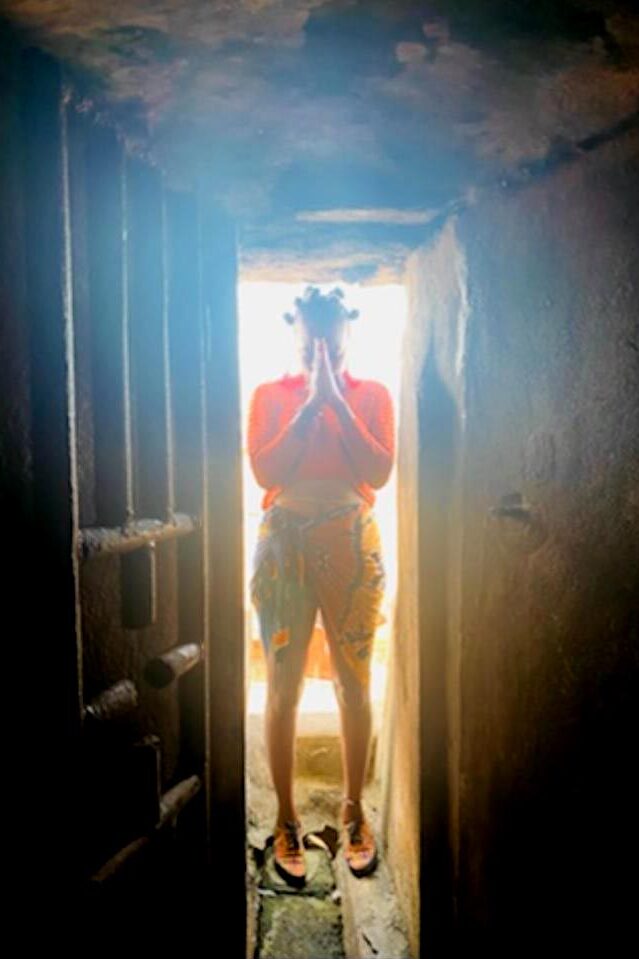
Photo of the Author, returning to face the “Door of No Return,” located on the Gold coast of Ghana, West Africa where enslaved persons where transported as human cargo and shipped to North America and the Americas.
By Shameka Poetry Thomas, PhD
All I know is that growing up Black-American in North America, I have been socialized and surrounded by whiteness my entire life. Even while graduating with distinguished honors from a historically Black college in Atlanta, Georgia. Even while growing up in Black Miami, attending an African Methodist Episcopal church. Even while returning and living in an African majority space (Ghana), I notice the middle passage within my tongue, my accent, and my brain cells. Whiteness like a thunder, still psychologically present, hegemonic, and consuming. No matter the physical location on this planet, there is no escaping the ramifications that colonialism left behind. That shadow. Everything about my existence becomes questionable because of it: my chocolate skin, my hair, my eyes, my ovaries, my infants, my breath, my jogging through neighborhoods. Even words like “third world” or “developing country” have undertones of neocolonialism, specifically about the “world-order” because it neglects to acknowledge that natural resources are taken from such nations to sustain the global economy of first-world, developed nations. coughing: Europe and / or North America*
Radical self-care, for me, meant returning to the “Door of No Return,” to stand facing-forward. Discovering my inner beauty without the shadow of the white gaze in my mirror, hunting me in my travels or in my writing. Toni Morrisons’ novels holding me at night. Radical self-love also meant refraining from the romanization of continents and populations that has been raped. I had embraced that this journey is not pretty, which makes it so naturally sweet. And for some people, naturally sweet is—bitter: Aloe Vera, tea oil, cayenne pepper.
A beautiful voyage into chocolate. Could that ever be possible without it being sci-fi? Could I write about what it means to be psychologically independent from oppression? Could I experience the gorgeousness of human life across the African Diaspora and call it pleasure, beyond it being seen as “dirty” and “exotic”? Could this narrative be seen as sacred and holy, as it is? Meaning, could I call myself a traveler without Europe or Europe’s hand in my pocket? Do I even know what that means? Would my audience even know what that means? Could I be that free? I do not know.
What I do know is:
Ultimately, when I say the African Diaspora, I do not necessarily mean only visiting countries of the transatlantic slave trade or “middle passage,” or between West Africa and the Americas. Every city on this planet was severely impacted by the transatlantic slave trade. There were also countries that were impacted by colonialism, beyond being a direct portal of human cargo. I am particularly curious, however, about what it means to see and perceive my own lived experiences (in my own chocolate skin), in any country where I can allow myself to tap into the metaphysical realm of my inner voyage as true self-discovery and political pleasure.
Can I stand in this “door of no return” and give honor to grandmothers whose names I will never know? Names stolen; bodies raped. Can I stand in this doorway and cry by myself? Can I allow myself to be upheld by invisible ancestors who whisper affirmations and drums to soothe my heart, as a long lost granddaughter returning? Can I not speak in English? Can I not think like an American? Can I step outside my socialization? Can I put my hair in Bantu knots and wear waist beads and be seen as goddess and glory?


©2024. Made with (❤︎) in Yachayninchik